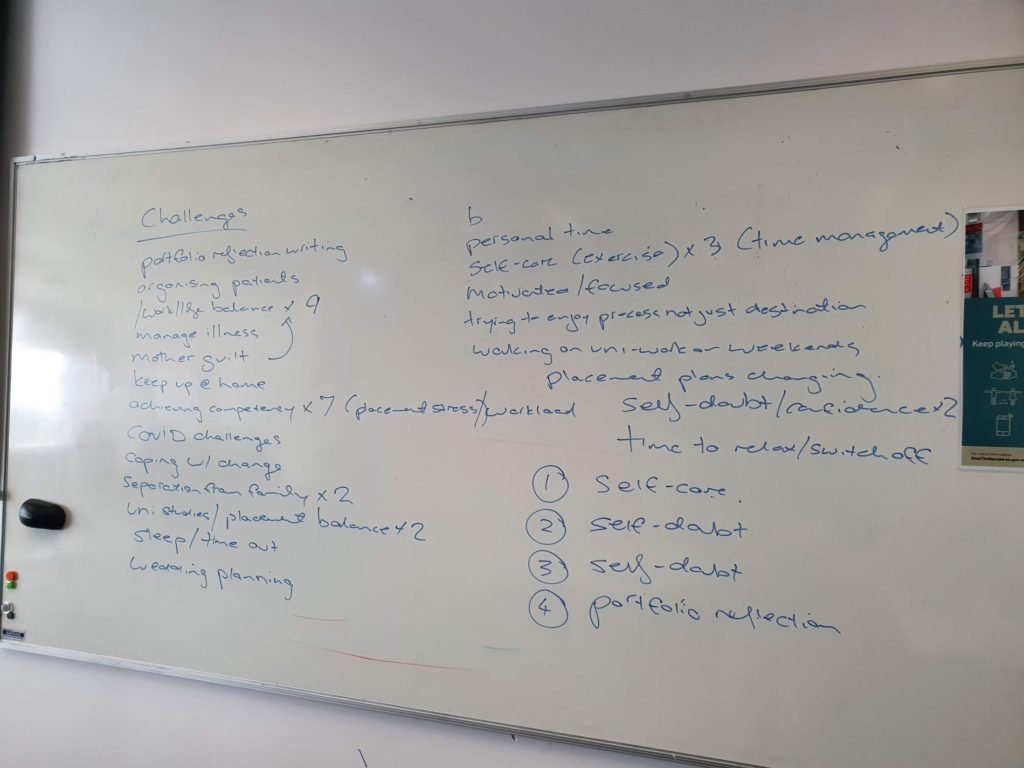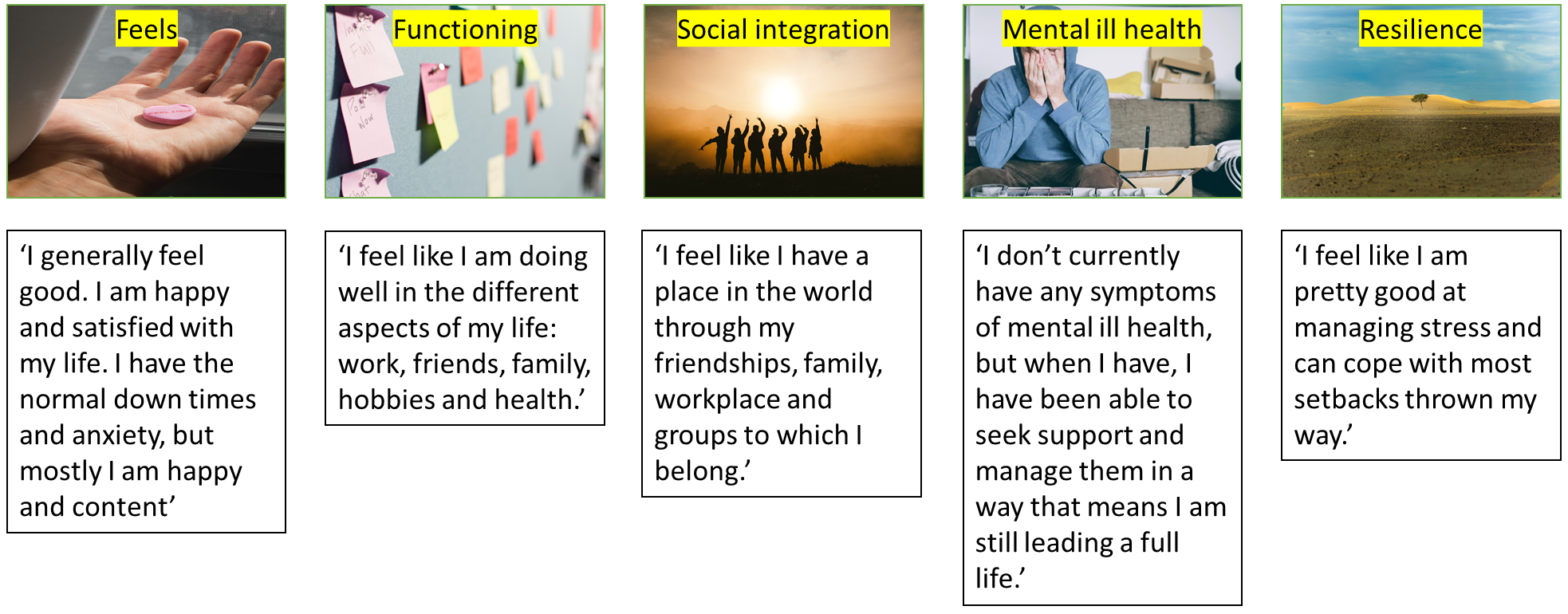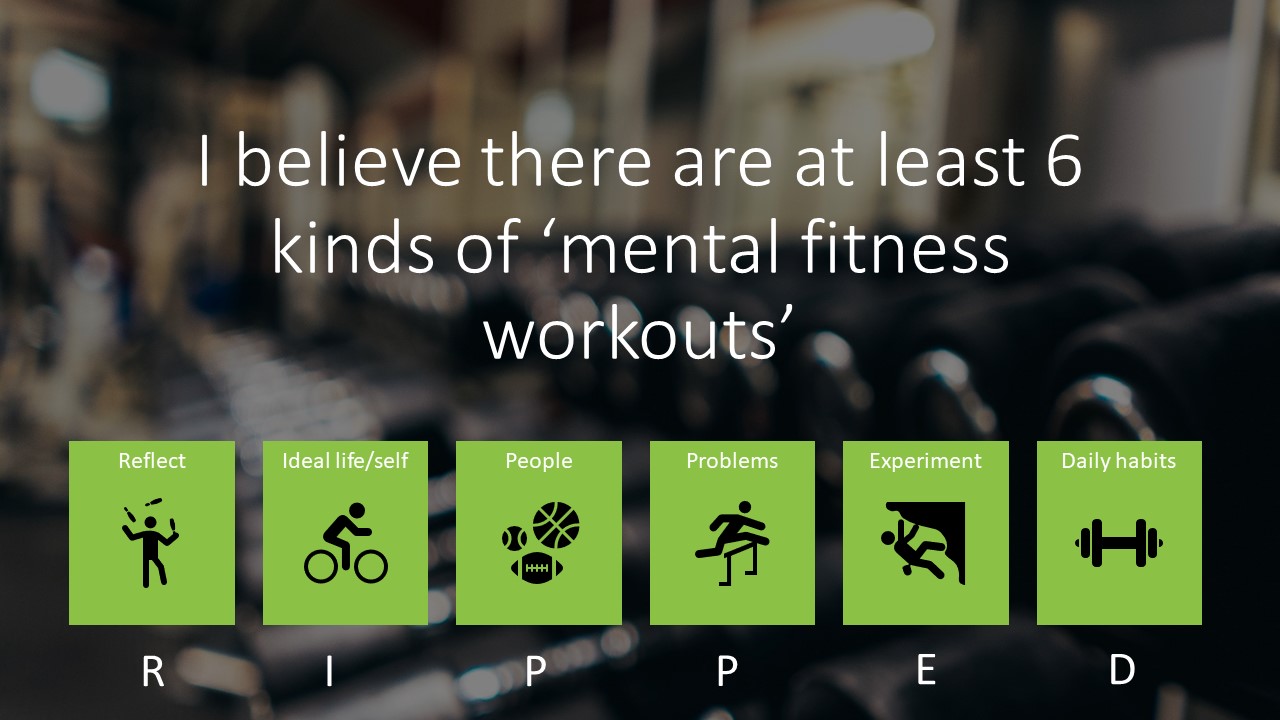
I got to spend a really cool hour with some dietetics masters students yesterday.
We did a ‘mental fitness workout’. And I thought I’d share the process on here.
I started with a rapid primer on building wellbeing. It is a combination of my own mental fitness stuff and content from the Be Well Plan, which I have become a facilitator of.
We then did a group mental fitness exercise, which I can’t obviously reproduce as a blog post, but I can tell you how to reproduce it in your everyday life.
I think it went well. I find students tend to be very kind to me, even if I do a craptacular presentation, but I got the sense the session was at least mildly valuable. Even if just as an opportunity for them to air the kinds of challenges they’ve been dealing with over the past few months.

So lets go through the process…..
A rapid primer on wellbeing
As a psychologist I am interested in helping people improve their mental health.
Mental health is defined as ‘a state of well-being in which an individual realizes his or her own abilities, can cope with the normal stresses of life, can work productively and is able to make a contribution to his or her community.’
Mental health is a positive concept, something that you want to move towards.
Good mental health is characterised by the following:

Thus the job of a psychologist in a field like mine is to help people achieve these states:
- to be able to elicit positive emotions
- to be able to understand and manage unpleasant emotions
- to help them function better in the different domains of their life
- to manage, treat and maybe even cure the symptoms of mental ill health
- to build resilience to cope with difficult times and setbacks
We do this in a variety of ways.

Every time I send someone off to engage in an activity that I think will help them improve their mental health, I think of it as sending them off to do a ‘mental fitness workout’.
Using the language of doing a ‘workout’ helps to explain to people what they might experience along the way.
- If we haven’t done a particular type of workout before, we’ll probably find it hard to do. It will leave us tired and sore the first few times we do it.
- The more we engage in the workout, the better we’ll get at it and the fitter we’ll become.
- We may need to continue doing the workout (or something similar) to maintain the gains we achieved from starting it in the first place.
I’ve spent a lot of time thinking about what constitutes a ‘mental fitness workout’. There are literally hundreds, if not thousands of activities that a person could engage in that would positively impact their mental health.
Rather than try to document each of them (a lifetime job), I’ve instead tried to focus on broad workout categories.
I think there are 6 types of mental fitness workout (this might change in the future).
- Reflection – activities where you reflect on how your life is now, your strengths and weaknesses, likes and dislikes, successes and failures (where I am now, where I have been)
- Ideal self and life – activities that involve you imagining your ideal life and self (where I want to be)
- People – activities that help you build and nurture a network of people who support you to be the best version of yourself that you can and for whom you reciprocate that support (the people in my life)
- Problem solving – activities where you deliberately identify and solve the main problems in your life, from the small daily ones to the bigger life-defining ones (the barriers and obstacles I need to overcome)
- Experimentation – activities where you experiment with new ways of thinking and behaving, trying new things, having new experiences (a way to practice change and trigger growth)
- Daily and weekly habits – activities to develop daily and weekly habits and routines that move you closer to your ideal life and self (the small steps that get me to my bigger goals)
You can remember these using the acronym R.I.P.P.E.D

Now I am mindful of the fact that the term ‘ripped’ in the context of mental health is usually used to describe someone who is extremely intoxicated by drugs or alcohol.
I’d like to be clear that I am not suggesting drug use is a way to achieve mental fitness! With the exception of prescribed drugs for specific conditions (which can yield significant psychological benefits), most recreational drug use has a negative impact on psychological health in the medium to long-term.
But I wanted a memorable acronym to capture the different mental fitness workout types and I think I have achieved that 🙂
Mental fitness training
So, if you wanted to engage in a mental fitness training session in order to improve your mental helath, you could pick any one of the workout types or even combine them.
With the dietetics students, we did a mental fitness workout that combined ‘Reflect’, ‘People’ and ‘Problems’.
This is how it worked.
Individual students were asked to identify the top 3 challenges for them over the past few weeks (‘reflect‘). We documented all of these different challenges on the whiteboard.
Students then got into small groups (‘people‘) and picked a challenge off the board.
They were given a set of ‘problem-solving questions’ that they then applied to the selected challenge to come up with potential solutions (‘problem‘).

At the end of 15 minutes, each group reported back on their potential solutions, so that all groups got the hear the different ideas people had come up with to better manage the challenges they had identified at the beginning of the session.
Thus in half an hour, each person in that room had engaged in a mental fitness workout consisting of:
Reflecting on their life at present and then drawing on the support of those in their social network to generate solutions to problems they were facing.
BAM! – work that mental muscle!
How can you do this in your own life?
It is pretty easy to mimic this mental fitness workout in your own life.
- Take a moment to jot down the main challenges you are facing that are getting in the way of you living a happier and more productive life. They can be big or small challenges.
- Prioritise them and pick the one you think needs addressing most urgently but where you aren’t sure of the solution.
- Schedule a time to catch up with a close friend, family member or colleague.
- As part of the catch-up, ask the person if it would OK if you shared something you are struggling with and whether they’d be able to help you brainstorm a solution.
- If yes, describe the problem.
- Keep an open mind as you hear their ideas and potential solutions.
- Aim to finish the conversation with a plan in place for how you think you might address the problem.
- Remember to reciprocate and help the other person with their challenges if appropriate.
Where to learn more
Yesterday I was putting the finishing touches on my mental fitness workshop, which will launch soon on Oasis Online.
In that workshop I go into more detail on the topic of mental fitness and provide more examples of mental fitness workouts.
I also plan on building a community of students interested in self-development and self-improvement. If that is you, drop me a quick email at gareth.furber@flinders.edu.au

